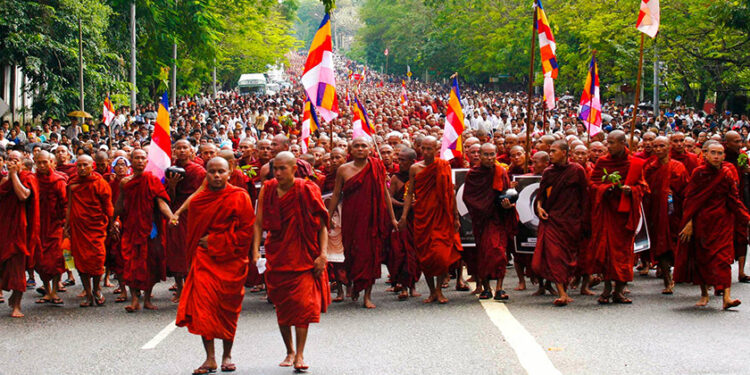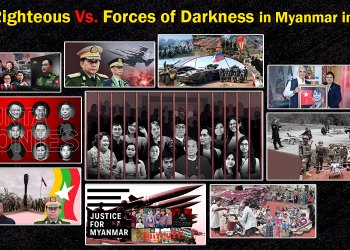This week marks the 11th anniversary of the Saffron Revolution, a series of mass protests led by Buddhist monks against Myanmar’s military government. In this commentary from November 2007—just two months after the demonstrations—The Irrawaddy English edition editor Kyaw Zwa Moe illuminates the power of hope in the country’s fight for democracy.
The September 2007 uprising was a struggle between the sons of Buddha and the forces of darkness and repression. In the struggle for democracy, hope is the key. The battle lines are drawn more clearly now than ever before.
Nothing can defeat Burma’s military regime—at least to date. All attempts at peaceful or violent means including armed struggle, people’s uprisings, international sanctions and political engagement have failed.
Most recently, even the Buddha’s Dhamma was quashed by the guns of the ruling Buddhist generals. The streets of Rangoon were stained with the blood of monks who religiously and peacefully chanted the “Metta Sutta,” the Buddha’s words of loving kindness:
“Let everyone be free from harm. Let everyone be free from anger. Let everyone be free from hardship.”
During the past four decades, thousands of innocent lives have been sacrificed in the hope of creating a democratic nation based on the rule of law. The road ahead sometimes looks like a repeat of the past, filled with the same sort of wishful thinking, meaningless proposals and condemnations that are repeated year after year—yet nothing changes.
For me, September 2007 seems like déjà vu. As a high school student-protester in 1988, I was frozen in my tracks by the sight of a gleaming bayonet at the end of a rifle held by a soldier with hate in his eyes, ordering me to back off. Luckily, I wasn’t one of the thousands of protesters who were shot, stabbed or beaten on the street.
In September, it was clear the generals were as determined as ever to beat down anyone who protested, including monks. This time, the demonstrators, with anger and tears, stepped back before thousands were again killed.
This time, it was a battle against the Buddha’s words, chanted by the Sangha—the sons of the Buddha. Leading monks repeated over and over: “It is a fight between Dhamma (justice) and Ah-dhamma (injustice).”
This time, with lightning, well-calculated moves, the pro-democracy movement was quickly beheaded as most of the seasoned opposition leaders, including prominent activist Min Ko Naing and his fellow leaders, were quickly rounded up by security forces.
The Burmese generals who are seen as “stupid,” “uneducated” and “unqualified” by many of their critics have again outwitted the people of Burma and the international community.
Unlike in 1988, there were no serious discussions to continue the uprising through some other means, such as armed struggle. Various ethnic rebel groups have waged the region’s longest armed struggle since the late 1940s, able in some cases to achieve a standoff, but with no hope of further gains.
The September 2007 uprising is a struggle that hasn’t ended. It will continue—just ask the political prisoners who are in the junta’s notorious prisons throughout the country.
I was imprisoned from 1991 to 1999, spending time in two prisons. Once you commit yourself to opposing the junta, the struggle never ends. In prison, we sat in our cells, anxiously hoping for strong UN resolutions. We hoped for strong support from regional neighbors. Unfortunately, our hopes were in vain. The UN and the neighboring countries offered no meaningful change.
Some things are different this time. I do not believe my former fellow prisoners, including some leaders of the 88 Generation Students group who are now in prison, hope for any quick fixes.
There it is: no hope for quick fixes. But as long as the people continue to struggle, there is hope.
My only true certainty is in the unwavering spirit of those committed leaders who will continue to struggle for democracy in spite of the harsh crackdown. I know that if they never stop struggling for positive change, hope will live.
For instance, a coup within the military is always a possibility. As more information floods the world, including inside Burma, there must be officers who have more enlightened liberal views, who understand that Burma has more to gain by joining the world community. The fact that such officers have not yet acted doesn’t mean there’s no hope.
Also, how about the leaders of China and India, two of the generals’ allies that have viewed the crackdown as an “internal affair?” That type of head-in-the-sand attitude is dangerously anachronistic in today’s world and is doomed to backfire. China has clout, and there is hope that it may use its power to influence the generals to move toward some form of power-sharing, even while holding on to power. That would be a step in the right direction.
So, there’s still hope for the democracy movement.
Recently, I spoke with leading activists who are deeply engaged in the democracy struggle.
“We confront their bullets,” said one of them. “We put our heads under their clubs. We sacrifice and do as much as we can. Soon we will be thrown in prison again. We don’t know when we will come out from that hell. Who outside can carry out this task?”
That is the question the pro-democracy movement inside and outside the country and the international community must now answer.

















